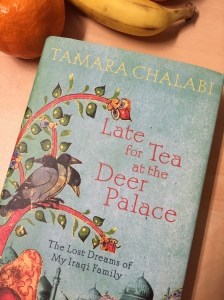
Some parts of the world are no longer easy to travel to because they’re dangerous, yet once upon a time they attracted tourists from everywhere. Like Syria, which I was lucky to visit back in 2006 (and I didn’t realise it would turn out to be a once-in-a-lifetime experience). Another country I’ll probably never visit is Iraq, which has more-or-less been a no-go zone too. But I enjoy reading about a bygone era in Iraq when it was much safer to visit, like the world that’s depicted in They Came to Baghdad by Agatha Christie. Lately I’ve been reading a memoir that also describes that world called Late for Tea at the Deer Palace. Tamara Chalabi is a Harvard trained historian who is also the daughter of Ahmed Chalabi, a prominent Iraqi politician.
The reason Iraq is on my mind at the moment is because of a wonderful event I attended in Fairfield two weeks ago called Little Baghdad, presented by the Powerhouse Youth Theatre. I got the tip off to attend from my friend Jiva Parthipan, one of the directors. It was a singularly immersive event that was part theatre performance, part interactive art experience and part dinner party, and included live music and dance.
We went to the second night of The Long Table, entitled ‘Women of Iraq’, which featured women from Iraqi backgrounds of different ages sharing their stories between the various courses of food and art activities. It was a social occasion, with interesting conversation and delicious food. Half of the guests that Friday night were invited from the Iraqi community; the other half were punters like us. The event was catered by The Parent’s Cafe, which initially started out as a small initiative aimed at involving refugee families in their children’s schooling.

One thing the night made me think about, which goes far beyond just this particular event, is what floats to the top when people and communities have limited public space to talk about their experiences. It explains why, when we hear from migrants, their stories often end up being a grand narrative along the lines of ‘my journey’ with the biggest events getting the most emphasis. The nuances may not get much of an airing. An example of what I mean happened on the night, where one of the oldest women talked about her time with the Iraqi women’s league back in Baghdad during the 60s. She mentioned going to Mongolia for a meet-up and I would’ve loved to have heard that particular story because I’m sure it would’ve given great insight into Iraqi feminism during that time. As it was, it became a passing mention which couldn’t compete with big ticket items like escape from war, multiple migrations and the birth of children. But perhaps that’s fair enough, because when we each look back on our lives, it probably is those sorts of emotionally heightened and definitive experiences that we’ll talk about the most, and the rest become memories rarely recalled.
Ultimately, creating space for such under-told stories is why an event like The Long Table is important. Not only for the participants involved, but a receptive audience eager to learn more about places they might never see first hand.
The next component of Little Baghdad is on this coming weekend, Let’s Party Like it’s 620BC:
Let’s Party promises to be an event like no other. Each day will feature commissioned video art, performances, presentations, 3D installations, Iraqi games and food (provided by The Parent’s Cafe), culminating in a traditional Iraqi dance party with music performed by the wonderful Choir of Love.


I wish something similar was going on in the UK… Late for Tea looks enchanting. I’m currently reading ‘Cities of Salt’ which is based in pre-conflict Syria.
That sounds like a good recommendation, thanks, I’ll look that book up once I’ve finished this one!
You do go to interesting events.
Countries we can now not visit has been on my mind. In the 1970s lots of Australians travelled from Katmandu to London by bus. My sister being one of them.
They went through Afghanistan and Iraqi, where today that is not possible. However we are now able to travel through the ‘Stans which were previously part of the Soviet Union and not generally accessible.
I envy travellers from the 70s because they had that sort of freedom though I do believe the culture of independent travel is generally more sophisticated now and we think more about our own positionality in relation to locals…right?